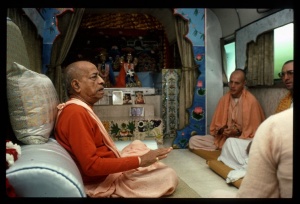SB 3.1.21

A.C. Bhaktivedanta Swami Prabhupada
TEXT 21
- tatrātha śuśrāva suhṛd-vinaṣṭiṁ
- vanaṁ yathā veṇuja-vahni-saṁśrayam
- saṁspardhayā dagdham athānuśocan
- sarasvatīṁ pratyag iyāya tūṣṇīm
SYNONYMS
tatra — there; atha — thereafter; śuśrāva — heard; suhṛt — kinsmen; vinaṣṭim — all dead; vanam — forest; yathā — as much as; veṇuja-vahni — fire due to the bamboos; saṁśrayam — friction with one another; saṁspardhayā — by violent passion; dagdham — burnt; atha — thus; anuśocan — grieving; sarasvatīm — the River Sarasvatī; pratyak — westward; iyāya — went; tūṣṇīm — silently.
TRANSLATION
At the place of pilgrimage at Prabhāsa, it came to his knowledge that all his relatives had died due to violent passion, just as an entire forest burns due to fire produced by the friction of bamboos. After this he proceeded west, where the River Sarasvatī flows.
PURPORT
Both the Kauravas and the Yādavas were relatives of Vidura, and Vidura heard of their extinction due to fratricidal war. The comparison of the friction of forest bamboos to that of passionate human societies is appropriate. The whole world is compared to a forest. At any moment there may be a flare-up of fire in the forest due to friction. No one goes to the forest to set it on fire, but due only to friction between bamboos, fire takes place and burns an entire forest. Similarly, in the greater forest of worldly transaction, the fire of war takes place because of the violent passion of the conditioned souls illusioned by the external energy. Such a worldly fire can be extinguished only by the water of the mercy cloud of saints, just as a forest fire can be extinguished only by rains falling from a cloud.